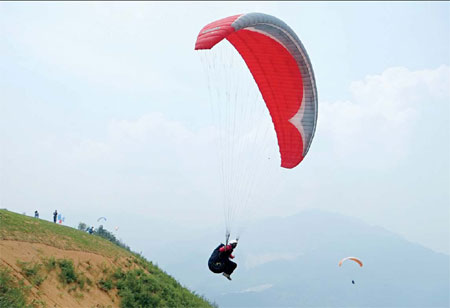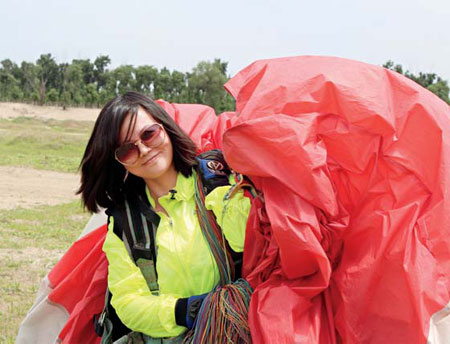Adrenaline sky junkies
Updated: 2013-09-13 10:15
By Nicole Sy and Alicia Zhang (China Daily)
|
|||||||||||
China's paragliding enthusiasts brave bitter cold and the risk of injury to pursue their sport
Zhao Meiyuan is silent. His tanned, weathered face points upward to the sky, brows knit in concentration. He is concerned with one thing: wind speed on the outskirts of Beijing in Chaobaihe (潮白河). No more than six meters per second is the rule, so today is a go.
Zhao is the founder and chief coach at Super-Wing Paragliding Club (大羽滑翔俱乐部 Dàyǔ huáxiáng jùlèbù) in Beijing. For each day of flying, he or his coaches go through the checklist of safety measures to ensure that paragliders (滑翔伞运动员,huáxiángsǎn yùndòngyuán), or pilots, are not exposed to more risk than one would expect hundreds of meters above the ground attached to a parachute(滑翔伞, jiàngluòsǎn).
Wind speed, check. Temperature, not more than a 12 C difference in a single day, check. Equipment, check.
When the coaches give the go-ahead, everyone heads for Chaobaihe.
Once there, Hebe Hua waits for her turn to practice raising the parachute vertically under Zhao's tutelage. She wears a floppy, black fisherman's hat and army fatigues that are a couple of sizes too large, but she has a big smile on her face.
"Normal life is too boring and work pressure is very heavy," says Hua. "That's why we like these extreme sports (极限运动,jíxiàn yùndòng), it excites us, and makes life more fun."
Flying or dreams of flying do not just appeal to the stereotypically athletic, young adrenaline junkies. In China, pilots come from far-flung corners of the demographic chart - from yuppie CEOs to 60-year-old grandparents.
Liao Yu, in her early-30s and is a consultant, started taking paragliding lessons in 2011 and travels around the world with her equipment, seeking her next adventure.
"I take it with me so I can paraglide when I travel. I bought portable equipment that only weighs 14 kilograms, so it's easy to carry," she says, clearly proud of her set.
"I spent this weekend in Linzhou, Henan province, which is a good place for paragliding, but, for the past year and a half, I've flown not only in China, but also in Turkey, France and Spain."
Not everyone has had such an easy time getting off the ground. For many, flying is just a dream. This was true of 63 year-old Chen Tieguang who chased his dream for decades until his first flight on his 50th birthday.
"My first flight was in 1999, in Mang Mountain, in the Beijing Ming Tombs Scenic Area, Changping district, where many people used to practice in the late 1990s. Then, the sky was already filled with parachutes," he remembers fondly.
"That day, in the morning, I trained on the ground for two hours in the afternoon. Then, I tried the small-hill flight, and I finally flew into the sky. The next day, I flew up to 530 meters. From then on, I never tired of flying," he says excitedly.
But paragliding, like other extreme sports, is not without its risks. Pilots have to maneuver their parachutes using lines, harnesses and brakes, as well as using thermal air currents to launch themselves higher and lower.
Essentials also include reserve parachutes, carabiners, helmets, speed systems, radios and GPS systems.
Additionally, pilots must wear warm, comfortable and wind-resistant clothing along with sunscreen and lip balm to protect them from the elements.
And what about accidents? Technology, Zhao says, can reduce the chances of accidents, but there is still risk involved.
"Thirty percent of the risks are not controllable, and you can not predict unforeseen circumstances," Zhao says.
That, however, shouldn't stop anyone from trying paragliding. It certainly didn't stop 63-year-old Chen. He has had a few close calls himself. One occurred in October 2009, when he was 59.
"I just took off and was not too high, still rising, when I noticed there was something wrong with the parachute," he recalls.
(我刚起飞,飞得还不算很高。上升中我发觉降落伞有点不对劲。Wǒ gāng qǐfēi,fēi dé hái búsuàn hěngāo, shàngshēng zhōng wǒ fājué jiàngluòsǎn yǒudiǎn bú dùijìn。)
"I thought that it would be OK, that - if I continued to adjust it - the parachute would return to its normal state, so I didn't use the reserve parachute to escape. But soon, the parachute descended quickly, slamming me into a large pine tree. My right elbow rammed into something hard and it dangled limply. I thought my elbow was dislocated. I was upside down in a tree, about two to three meters from the ground when I fainted.
"When I woke up, I was in the hospital. My friends had taken me there. The diagnosis was that the bones in my right elbow were smashed into tiny pieces."
After surgery and a few months of rest, Chen was out in his parachute again.
Today, there are a few thousand para-practitioners in the country, and Beijing is where you can find the most, a few hundred according to Zhao's estimates.
However, factors specific to Beijing threaten the city's rank as the top spot in the sport's future.
China takes a tough stance on unauthorized flying and pilots caught flying without an official permit may face criminal detention.
Apart from that, the city's weather also leaves a lot to be desired.
"The winter lasts three to four months," Zhao explains. "It's very cold and inconvenient for flying." Average temperatures from December to February are well below zero degrees Celsius and can dip to as low as -20 degrees on the ground, and it's much colder zipping through the air, 600 meters off the ground.
But, the weather is no bar for Beijing's paragliding-addicts. "If you can endure the chilly weather, you can fly. But it means that you really have an addiction (flying)," Zhao says. "Sometimes I fly in the winter."
For Chen, and others who love to take to the sky, it's much more than a hobby.
"Sometimes, when I fly in the sky and if the weather is very fresh and clean, I feel I'm swimming in a deep ocean. It's deeply emotionally and mentally relaxing." (空气清新的时候,飞在空中就像在深海里畅游一般。这种感觉能让人完全放松。Kōngqì qīngxīn de shíhòu, fēi zài kōngzhōng jiù xiàng zài shēnhǎi lǐ chàngyóu yībān. Zhèzhǒng gánjuě néng ràngrén wánquàn fàngsōng。)
Courtesy of The World of Chinese,
www.theworldofchinese.com
The World of Chinese

|
Top: One of Beijing's high-flying para-enthusiasts soars on the winds of the capital. Above: Hebe Hua at her third training session, looks forward to finally taking to the sky. Photos Provided to China Daily |
(China Daily European Weekly 09/13/2013 page27)
Today's Top News
List of approved GM food clarified
ID checks for express deliveries in Guangdong
Govt to expand elderly care
University asks freshmen to sign suicide disclaimer
Tibet gears up for new climbing season
Media asked to promote Sino-Indian ties
Shots fired at Washington Navy Yard
Minimum growth rate set at 7%
Hot Topics
Lunar probe , China growth forecasts, Emission rules get tougher, China seen through 'colored lens', International board,
Editor's Picks

|

|

|

|

|

|






